LIAM BRADY was named as Billy McNeill’s successor as Celtic manager in June 1991.
The charismatic Irishman arrived with a dream for the club, but his vision had become blurred by the time he departed in early October 1993.
In another CQN EXCLUSIVE series, author Alex Gordon opens his book files to look back at an intriguing and compelling chapter in the club’s history.
Here is another edited extract from Alex’s tribute book, ‘The Winds of Change‘, published by CQN in 2015.
Please enjoy.
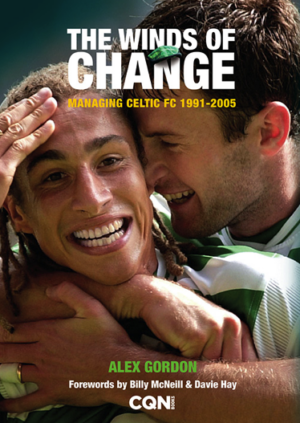
CELTIC travelled across Glasgow to kick off 1993 with a January 2 meeting with league leaders Rangers at Ibrox.
Liam Brady’s team were trailing by eight points and he knew he faced another must-win encounter. Without too many options, he selected the same line-up that had lost the previous week to Dundee United.
Andy Payton missed a sitter when he was one-on-one with Andy Goram and fired the ball against the keeper. Gerry Creaney slid one wide of the upright with Joe Miller better placed for a pass. Tom Boyd, up with the attack as usual, hit one just wide. In the thirty-fourth minute Rangers went up the park and scored the game’s only goal.
John Brown took a free-kick on the halfway mark and rolled the ball to Ian Ferguson. No-one picked up the midfielder as he took the opportunity to take a touch and then hit a cross practically onto the head of Mark Hateley. He nodded it across the face of the six-yard line and Trevor Steven, arriving at pace, left Pat Bonner helpless with a searing header.
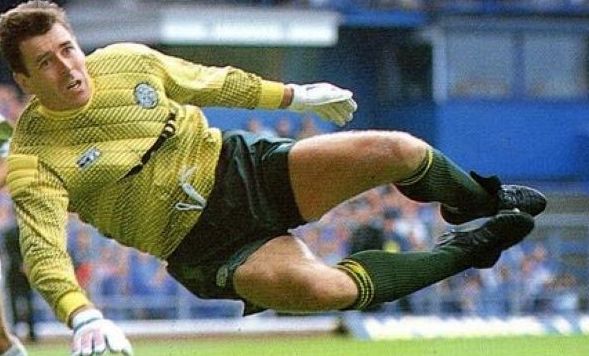
DEFIANT…Pat Bonner pulls off a flying save, but he was helpless with the only goal of the game at Ibrox.
At this stage, Liam Brady must have been wondering where he could get hold of a player who could actually defend inside his own penalty area. Largely, Celtic controlled the second-half with Walter Smith content for his team to sit back and hit a vulnerable defence on the break.
The nearest Celtic got to a reward for their efforts came just before the end when John Collins rolled the ball under Goram, but left-back David Robertson arrived at the last moment to scramble it clear.
‘TEN AND OUT’ roared the back page headlines in the following day’s newspapers. Celtic were ten points adrift of the Ibrox side and a landslide behind on goal difference. Brady, though, was typically defiant. He made the valid assertion that his team had dropped five points from a possible six in the three Glasgow derbies and, with a little bit of fortune, the games quite easily could have gone the other way.
The statistics told a simple story, though. Rangers had forty points, Aberdeen had thirty-five and Celtic had thirty. The Parkhead side had played twenty-five games, two more than the team from Govan and one ahead of the Dons.
The Scottish Cup adventure stalled and then sunk without trace at the second hurdle. The season was just coming out of the first week in February and, once again, it looked as though Celtic would merely be going through the formalities. The pressure on Brady was growing by the day.
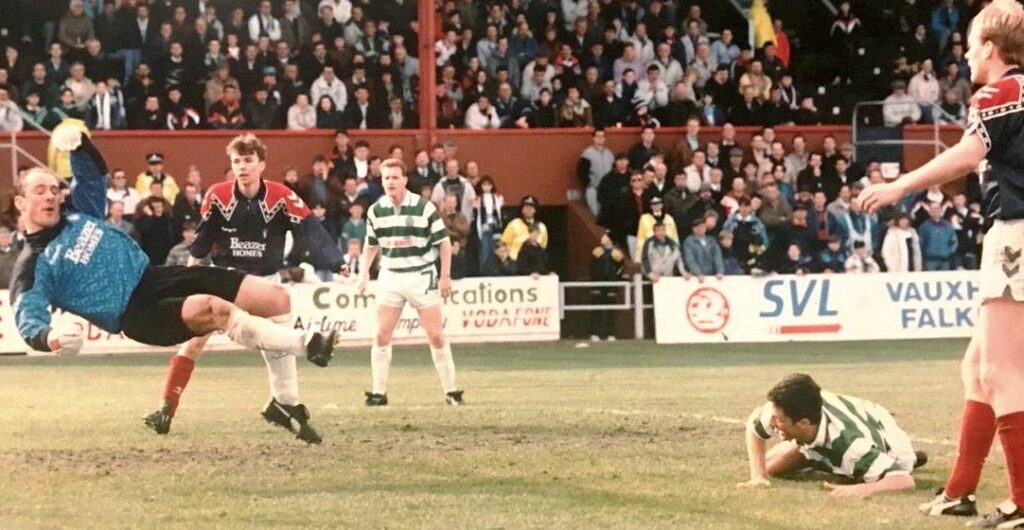
GROUNDED…John Collins attempts a header with Falkirk keeper Ian Westwater brought into action.
Celtic needed two goes to overcome Clyde in the opening round, drawing 0-0 away while a strike from Tommy Coyne separated the sides in the replay. Neither performance was lauded.
The hopes of the faithful were obliterated when Falkirk beat Celtic in the competition for the first time in their history. Once again, the club found it impossible to keep a clean sheet at Brockville. And veteran Pat Bonner had to take his share of the blame.
He looked jittery and unconvincing throughout and had already been rescued midway through the first-half by a Mike Galloway clearance off the line after Neil Duffy outjumped the keeper to direct a Ian McCall free-kick towards the net. A minute from half-time, Bonner underlined that he hadn’t learned his lesson and the home side took the lead when he failed to cut out a McCall corner-kick and this time Duffy’s header rattled the rigging.
Strangely, Celtic, with Paul McStay and John Collins in the line-up, had little or no imagination as they attempted to rescue their season after the turnaround. Andy Payton came on to play up front alongside Tommy Coyne, but it made little difference.
Seven minutes from the end, Falkirk scored again and there was no way back. Mike Galloway made a hash of a clearance from a routine Fraser Wishart free-kick and the ball fell nicely to the unmarked Eddie May who smashed it past Bonner. In the end, Celtic couldn’t score a goal against the team with the worst defensive record in the league.
Cries of ‘Sack the board’ were now becoming common place wherever the team played. Fergus McCann and Brian Dempsey were attempting to force change and there was talk of them getting rid of Brady and appointing their own manager.
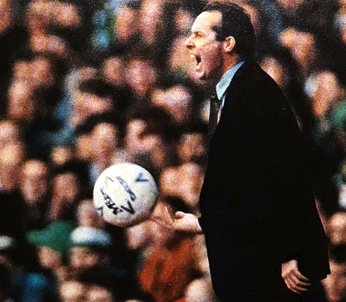
SHOUT OF ORDER…under-pressure Liam Brady has something to say.
Through all the turmoil, the Celtic team boss tried to remain focused. ‘No, it wasn’t pleasant,’ he admitted. ‘But I still had a job to do and I was doing it to the best of my ability.’
After the trauma of the Scottish Cup exit at Brockville, Celtic drew their next two league games – Aberdeen at Pittodrie (1-1) and Partick Thistle at Parkhead (0-0). Unexpectedly, they won their next six matches, among them were Rangers, toppled 2-1 in the east end of Glasgow.
The fans whooped it up, of course, but, once the dust had settled, the league table that evening still showed the Ibrox men ten points ahead with a game in hand. However, that mattered little in the immediate aftermath of the encounter on March 20 which emerged as Brady’s only win over the Ibrox men at Parkhead.
Walter Smith’s outfit went into the confrontation with an unbeaten record forty-four games in domestic competition to preserve. Celtic, with nothing but pride to play for, displayed an urgency right from the off that had been strangely lacking in other outings throughout an erratic campaign.
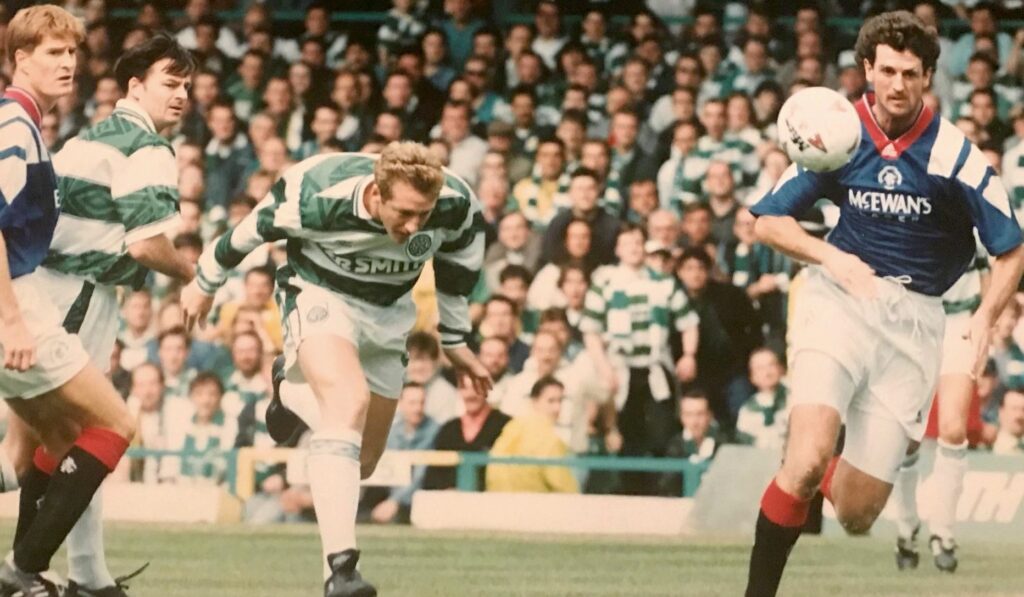
GREEN FOR GO…Frank McAvennie puts pressure on Rangers defenders Richard Gough and Davie MacPherson as team-mate Charlie Nicholas looks on.
Frank McAvennie, a free agent after leaving West Ham for a second time and following an ill-fated three-game period at Aston Villa, had returned in January. It was a signing that underlined the lack of cash in the Celtic coffers.
The thirty-four year old was actually photographed in the national press waving a Partick Thistle scarf while shaking hands on a deal with manager John Lambie at Firhill. Two days later he was a Celtic player.
Brady told me, ‘I think Frank is worth a try. I believe he still has got goals in him. He won’t play every week, but I think he could be a good squad member.’
McAvennie said, ‘I’m glad to be back, of course. I just hope John Lambie will forgive me. I couldn’t turn down the opportunity of returning to Paradise.’
* TOMORROW: Don’t miss the next riveting instalment of the Liam Brady story – only in your champion CQN.

